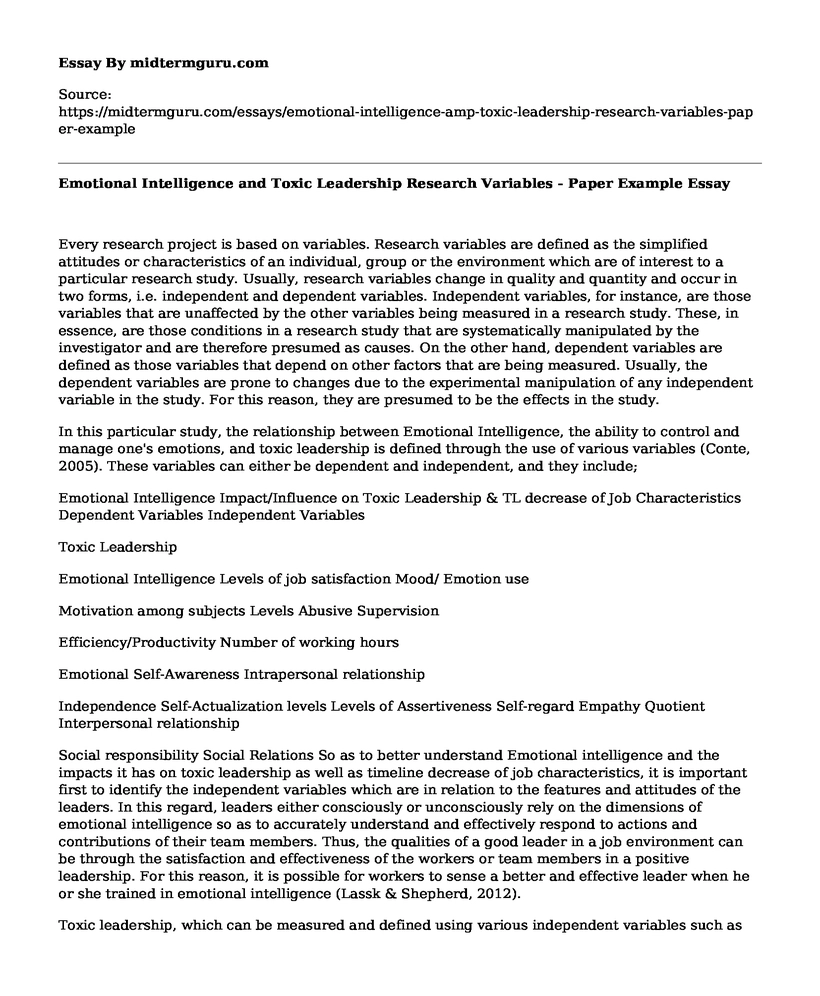Every research project is based on variables. Research variables are defined as the simplified attitudes or characteristics of an individual, group or the environment which are of interest to a particular research study. Usually, research variables change in quality and quantity and occur in two forms, i.e. independent and dependent variables. Independent variables, for instance, are those variables that are unaffected by the other variables being measured in a research study. These, in essence, are those conditions in a research study that are systematically manipulated by the investigator and are therefore presumed as causes. On the other hand, dependent variables are defined as those variables that depend on other factors that are being measured. Usually, the dependent variables are prone to changes due to the experimental manipulation of any independent variable in the study. For this reason, they are presumed to be the effects in the study.
In this particular study, the relationship between Emotional Intelligence, the ability to control and manage one's emotions, and toxic leadership is defined through the use of various variables (Conte, 2005). These variables can either be dependent and independent, and they include;
Emotional Intelligence Impact/Influence on Toxic Leadership & TL decrease of Job Characteristics Dependent Variables Independent Variables
Toxic Leadership
Emotional Intelligence Levels of job satisfaction Mood/ Emotion use
Motivation among subjects Levels Abusive Supervision
Efficiency/Productivity Number of working hours
Emotional Self-Awareness Intrapersonal relationship
Independence Self-Actualization levels Levels of Assertiveness Self-regard Empathy Quotient Interpersonal relationship
Social responsibility Social Relations So as to better understand Emotional intelligence and the impacts it has on toxic leadership as well as timeline decrease of job characteristics, it is important first to identify the independent variables which are in relation to the features and attitudes of the leaders. In this regard, leaders either consciously or unconsciously rely on the dimensions of emotional intelligence so as to accurately understand and effectively respond to actions and contributions of their team members. Thus, the qualities of a good leader in a job environment can be through the satisfaction and effectiveness of the workers or team members in a positive leadership. For this reason, it is possible for workers to sense a better and effective leader when he or she trained in emotional intelligence (Lassk & Shepherd, 2012).
Toxic leadership, which can be measured and defined using various independent variables such as levels of abusive supervision, number of working hours or even the mood of the leaders, usually is a combination of a number of vices which may include self-centred attitudes or other behaviors that may adversely affect the subordinate members or the organization as a whole. Some of the aforementioned independent variables substantially cause the dependent variables such as levels of job satisfaction, motivation as well as the efficiency of the subordinates or the team members in an organization (Chiva, 2008).
Emotional intelligence, on the other hand, is measurable through various variables such as interpersonal and intrapersonal relationships. These two are considered independent variables since they are the basis to various subcomponents which define the qualities of a good and emotionally intelligent leader. For instance, through the leader's interpersonal relationships with their subordinates, it is possible to measure his or her empathy levels, levels of social relations, as well as their social responsibilities (Dijk & Freedman, 2007). These, in essence, are the primary determinant of the kind of impact that emotional intelligence has on leadership qualities.
In conclusion, strong leadership values which can be measured through the extent of emotional intelligence in a leader, attract easily talented staff and are able to maintain them for a long time. On the other hand, toxic leadership, which is as a result of lack of emotional intelligence leads to dissatisfaction among the subordinates which in turn leads to low productivity in the organization (Carmeli, 2003).
References
Carmeli, A. (2003). The relationship between emotional intelligence and work attitudes, behavior and outcomes. Journal of Managerial Psychology, 18(8), 788-813. doi:10.1108/02683940310511881
Chiva, R., & Alegre, J. (2008). Emotional intelligence and job satisfaction: the role of organizational learning capability. Personnel Review, 37(6), 680-701. doi:10.1108/00483480810906900
Conte, J. M. (2005). A review and critique of emotional intelligence measures. Journal of Organizational Behavior, 26(4), 433-440. doi:10.1002/job.319
Dijk, C. F., & Freedman, J. (2007). Differentiating emotional intelligence in leadership. Journal of Leadership Studies, 1(2), 8-20. doi:10.1002/jls.20012
Lassk, F. G., & Shepherd, C. D. (2012). Exploring the Relationship Between Emotional Intelligence and Salesperson Creativity. Journal of Personal Selling and Sales Management, 33(1), 25-38. doi:10.2753/pss0885-3134330103
Cite this page
Emotional Intelligence and Toxic Leadership Research Variables - Paper Example. (2021, Jun 07). Retrieved from https://midtermguru.com/essays/emotional-intelligence-amp-toxic-leadership-research-variables-paper-example
If you are the original author of this essay and no longer wish to have it published on the midtermguru.com website, please click below to request its removal:
- Essay on Culture of Competitiveness According to Gordon Lankton
- Essay Writing Planning Example: The Three Challenges That Single Fathers Face in Raising Their Children
- Research Paper on Mental Health Facilities
- Cognitive Aging: Developmental Processes Across Adulthood - Resesarch Paper
- Leadership Strategies for Advocacy - Essay Sample
- Leadership in Organizations: How to Guide and Inspire - Essay Sample
- Paper Example on Procrastination and its Solutions







